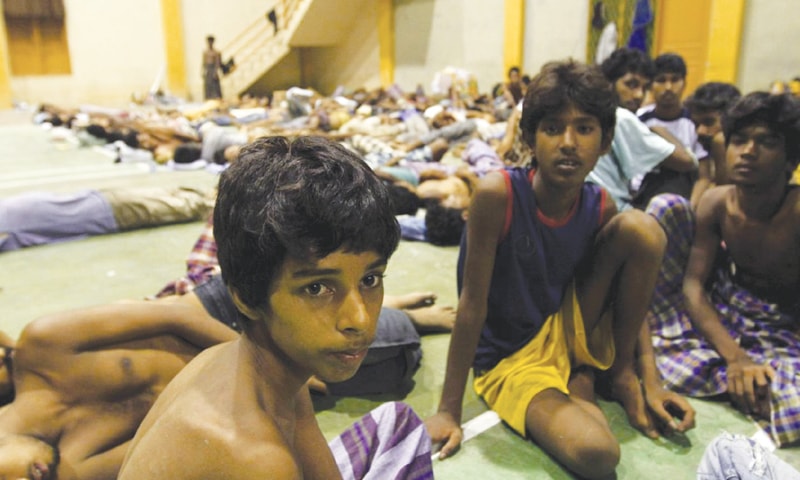YANGON: Poverty-stricken and loathed at home, Myanmar’s Rohingya are one of the world’s most persecuted minorities — yet their dire situation has long been ignored in Southeast Asia.
The Muslim community’s friendless status angers activists, who say that regional negligence can now be counted in lives lost as a wave of migrants find themselves in desperate straits at sea.
In recent years, sectarian violence and a thicket of discriminatory laws against the Rohingya in Buddhist-majority Myanmar have sparked the region’s largest exodus of boat-people since the Vietnam War.
More than 25,000 people, including many Rohingya but also economic migrants from Bangladesh, made the dangerous sea journey south from the Bay of Bengal between January and March this year, the UN says.
An estimated 1.3 million Rohingya scratch out an existence in Rakhine, one of Myanmar’s poorest states — tens of thousands are trapped in displacement camps, with conditions outside often worse.
“The [Myanmar] government has created conditions of life designed to be destructive to the Rohingya, leading people to take the seas in huge numbers,” Matthew Smith, from the human rights group Fortify Rights, told AFP.
Even though many Rohingya have generations-long ancestry in Myanmar, they are stateless and have long been viewed as illegal immigrants from neighbouring Bangladesh.
Denied citizenship, they face daily discrimination and a raft of restrictions including controls on their movement, family size, religious freedom and access to jobs.
The current boat exodus began in earnest after 2012, when fierce communal violence broke out between local Buddhists in Rakhine and the Rohingya, leaving more than 200 dead and 140,000, mostly from the Muslim ethnic group, in camps.
Since then, each spring a series of boats laden with desperate people has built up as Rohingya try to beat the monsoon storms on the sea journey south.
Hundreds die every sailing season, according to the UN refugee agency.
‘Friendless and despised’
Yet the flow of migrants has surged in recent months, as traffickers have stopped asking for up-front payments from the migrants.
Instead they demand large ransom fees to release their human quarry once they are at sea or ashore in Thailand or Malaysia, according to Hla Myint, a Rohingya leader in a refugee camp near the Rakhine state capital Sittwe.
That trend has led to boats being held at sea for weeks, with many more cast adrift particularly in recent weeks after the key staging point of Thailand finally began to get tough on the traffickers.
Yet his people are still willing to make the perilous journey because of the “very difficult situation” in Rakhine, Hla Myint said.
There are around 300,000 Rohingya also living in Bangladesh’s southern coastal district bordering Myanmar.
But Bangladesh recognises only around a tenth of that number as refugees.
“It’s no surprise that desperate people take to the sea in the hope of finding secure futures for themselves and their children,” said Nicholas Farrelly, a Myanmar specialist at Australia National University.
But they remain a pariah people in Southeast Asia, Farrelly told AFP, “left to float, friendless, and often despised”.
Myanmar, facing a crucial election year after decades of military rule and a surge of Buddhist nationalism, has shown no appetite to address the plight of the Rohingya.
Even Aung San Suu Kyi, the Nobel Peace Prize-winning democracy champion, has failed to come to their defence, with critics saying she is reluctant to alienate her supporters among the Buddhist majority.
But pressure has mounted on Myanmar since the current crisis began with the May 1 discovery of mass graves of migrants in remote smuggling camps in southern Thailand.
Thailand’s ensuing crackdown has led to thousands of Rohingya and Bangladeshi migrants being abandoned by their gang masters, many at sea without food and water.
Malaysia and Thailand have recent days launched a limited search-and-rescue effort for the stricken boats, and Bangkok has announced a regional meeting for May 29 to address the issue.
But in the Association of Southeast Asian Nations, whose members prize a policy of staying out of each other’s affairs, Myanmar’s neighbours have long deferred to it in side-stepping the Rohingya issue.
There are tentative signs that could be changing, with one Malaysian minister on Thursday demanding that ASEAN send a “very strong message” to Myanmar to stop being “so oppressive” towards the minority.
A senior Western diplomat in Yangon urged Myanmar’s regional neighbours to shoulder some of the humanitarian responsibility for a cross-border trafficking trade.
“But it is not helpful when the Myanmar government denies basic facts amidst clear evidence that thousands of smuggled migrants are coming from their country,” the diplomat told AFP on condition of anonymity.—AFP
Published in Dawn, May 15th, 2015
On a mobile phone? Get the Dawn Mobile App: Apple Store | Google Play


































